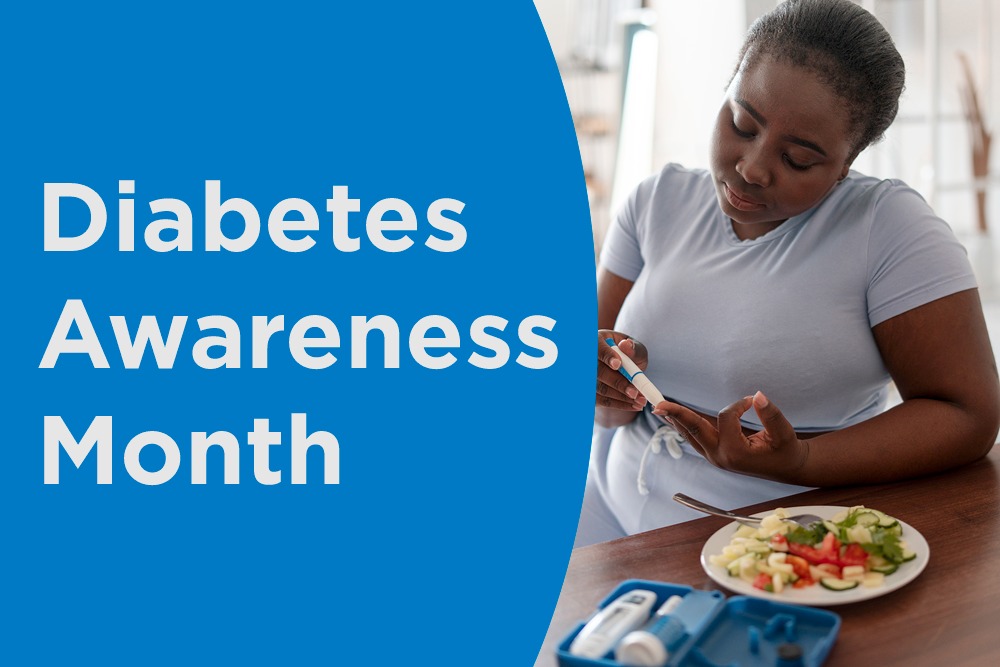For many, a diabetes diagnosis can feel overwhelming, but it doesn’t have to be. During National Diabetes Awareness Month, we are replacing confusion and uncertainty with a clear, actionable plan. Diabetes is a manageable condition. With the right support and consistent care, you have the power to take control of your health journey. Therefore, join us as we explore the three vital steps—from effective nutrition to consistent monitoring—that empower you to not just manage this condition, but to truly thrive.
The Reality of Diabetes in Oklahoma
Diabetes represents a serious public health concern, and the statistics are sobering, particularly in our state.
- Prevalence: About 1 in 8 Oklahoma adults (over 390,000 people) have received a diabetes diagnosis.
- Prediabetes: Furthermore, over 1 million Oklahomans are estimated to have prediabetes—a condition where blood sugar levels are higher than normal but not yet high enough for a Type 2 diagnosis. Alarmingly, many of these individuals don’t realize they face this risk.
- Complications: Uncontrolled diabetes drives severe complications, including heart disease, stroke, kidney failure, blindness, and lower-limb amputations. In fact, Oklahoma has witnessed a surge in diabetes-linked amputations, emphasizing the need for vigilant care.
Fortunately, with the right knowledge and commitment, you can effectively manage or even prevent Type 2 diabetes.
Your 3 Essential Steps for Diabetes Management
Whether you just received a diagnosis, have lived with diabetes for years, or focus on prevention, a successful health strategy revolves around a few key areas.
Embrace Healthy Eating
Food acts as medicine when you focus on blood sugar control.
Focus on Balance: Prioritize a diet rich in non-starchy vegetables, lean proteins, and healthy fats.
Carbohydrate Awareness: Become mindful of your carbohydrate intake, choosing high-fiber sources like whole grains and legumes over refined carbs and sugary drinks. Consult with a registered dietitian or certified diabetes educator, like those available at CCMH, to develop a personalized meal plan.
Get Moving
Regular physical activity is one of the most effective ways to lower your blood sugar and improve your body’s sensitivity to insulin.
Aerobic Activity: Aim for at least 150 minutes of moderate-intensity aerobic exercise per week (e.g., brisk walking, swimming, or cycling).
Strength Training: Incorporate strength-building exercises 2-3 times per week.
Consistency is Key: Break up long periods of sitting by standing, stretching, or walking every hour.
Monitor and Track Your Health
Knowing your numbers empowers you to make informed daily decisions.
Blood Sugar Checks: Consistently monitor your blood sugar as directed by your healthcare team. Log your results along with notes on meals, activity, and medication to understand your personal patterns.
Know Your Goals: Talk to your provider about your personal target range for blood sugar and your A1C goal (a measure of your average blood sugar over the past 2-3 months).
Foot Care: Check your feet daily for cuts, blisters, or sores. Poor circulation from diabetes makes foot care essential to prevent serious infections.
Partner with Our Experts
The single most powerful step you can take is partnering with an expert care team. Specifically, the Lawton Community Health Center (LCHC) Diabetes & Endocrinology Clinic, affiliated with CCMH, provides comprehensive, specialized care. They offer services spanning three vital areas: Endocrinology, Podiatry, and Diabetes Education. They provide the essential knowledge, skills, and emotional support you need to navigate daily life with the condition.
This November, make a commitment to your health. Take the step to learn your risk, get screened, and utilize the specialized resource available right here in Lawton. Call 580-250-6525 today to schedule your appointment with one of our specialists.
Resources:
- 2023 Oklahoma Diabetes Prevention Report (PDF)
- https://oklahoma.gov/health/health-education/community-outreach/community-development-services/office-of-chronic-disease/diabetes.html
- https://www.lawtoncommunityhealthcenter.com/lchc-diabetes-endocrinology-clinic/
- https://diabetes.org/
Disclaimer:
The Comanche County Memorial Hospital website does not provide specific medical advice for individual cases. Comanche County Memorial Hospital does not endorse any medical or professional services obtained through information provided on this site, articles on the site or any links on this site.
Use of the information obtained by the Comanche County Memorial Hospital website does not replace medical advice given by a qualified medical provider to meet the medical needs of our readers or others.
While content is frequently updated, medical information changes quickly. Information may be out of date, and/or contain inaccuracies or typographical errors. For questions or concerns, please contact us at contact@ccmhhealth.com.

